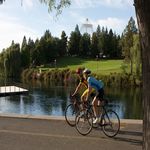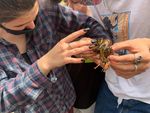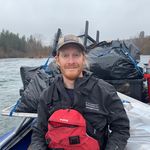Spokane Riverkeeper's Late Spring 2021 Update
←
→
Page content transcription
If your browser does not render page correctly, please read the page content below
Community Science Update, Preserving River Flows, Litter Cleanups, Toxic Permits Spokane Riverkeeper's Late Spring 2021 Update A Word from Your Riverkeeper Sustaining the flows of cold clean water for the Spokane River during the critical low-flow summer months is of vital importance to our River's health. Our water use in the City of Spokane can have an impact on River Health. Here at the Riverkeeper, we're representing the River on the City of Spokane's Water Resource Collaboration Group to improve on the City's Water Conservation Plan. We are working in collaboration with other stakeholders to build a set of recommendations for the Spokane City Council designed to contribute to healthy flows for native fish (trout, whitefish, and large-scale suckers, salmon recovery), recreational flows for boaters, and aesthetics for all. It is critical that we all understand that our use of cold aquifer water does compete with the River's need for water in the long hot summers when the river is low. Read our editorial in the Spokesman- Review on this issue. Community Science Updates If you'd like to know more about our community science programs and be notified of opportunities sign up for our community science email list. Our community science project, in collaboration with Spokane Falls Trout Unlimited, continues to exceed our expectations. In 2021, community scientists have performed 125 sample runs, collecting 500 samples and transparency readings. The photos keep rolling in as well, with the public now sending photos thanks to a sign placed on the fence above the Centennial Trail asking for submissions (see photos below). Despite the lower than average flow in Hangman Creek and lack of typical winter conditions, data shows that Hangman Creek causes the Spokane River at TJ Meenach to violate state water quality standards eight times this year! Here at the Spokane Riverkeeper, we're hard at work making sure the data makes a difference by entering it into state databases and having discussions with regulatory agencies.
Crayfish! This summer are offering an exciting opportunity to help understand the health of the Spokane River using crayfish, and we need your help! We are partnering with Idaho Water Resources Research Institute (IWRRI) to use crayfish to determine toxic pollution levels in our river. We will help to organize community scientists to catch the crayfish, and IWRRI will run the samples! Sign up for opportunities at on our community science email list above. River Cleanup Partnerships River cleanups are community driven, whether through the volunteers or partners that step up to make it happen. We are lucky to have an amazing sponsor in Northwest Renewables and a great partnership with the Spokane River Forum. Thanks to these collaborations, our spring cleanup removed 2,500 pounds of litter from the banks of the Spokane River, in addition to the 9,000 we've already removed this year. Thank you to the 427 volunteers who have stepped up this year to make this possible. To signup for our public cleanups, click here. If you see a litter problem, report it on our website. Or, if you have a group that would like to schedule a cleanup, let me know! I can either provide the supplies or lead it. Comment on the Sustainability Plan City Sustainability Workshops begin this week and run for the next
two weeks. These workshops are a great opportunity for people to
learn more about the Sustainability Action Plan and how to provide
feedback.
Do You Want to Live in a Sustainable City?
What is important for your quality of life in the place that you
live? More and more cities are developing sustainability plans,
but what do these proposals mean for our day-to-day life?
Join us in exploring how different sustainability policies could
shape our future - economically and socially in the face of rapid change. There are three
upcoming opportunities for you to engage and share your thoughts on the
draft Sustainability Action Plan:
May 20th (Thursday) from 6 to 7:30 PM
May 29th (Saturday) from 10 to 11:30 AM
June 3rd (Thursday) from 6 to 7:30 PM
For more information and to register, visit the SAS Website. If you want to schedule a
separate workshop for your organization, please contact us at sas@spokanecity.org.
Spokane Riverkeeper will email our homework and thoughts on the plan soon! - stay
tuned!
7th Annual (Virtual) Wild and Scenic Film Festival
In partnership with And here's a huge thanks to our sponsor
our underwriters, the the Community Building Foundation and to
Spokane our generous underwriters:
Riverkeeper is
bringing this Wild The Spokane Mountaineers
and Scenic Film Spokane Falls Trout Unlimited
Festival to you all The Lands Council
again for a 7th year. The Spokane Canoe and Kayak
The festival is a benefit for the Spokane Club
Riverkeeper and supports the work to The Riverside State Parks
Foundation
protect your Spokane River.
Virtual Film Festival June 30 7-9 pm WSFF TICKETS
Get your tickets, share with friends, and
save the date!
The films include:
A Northern Light
Tengefu
A Message From Paradise
Still River, Silent Jungle
River Looters
24 Leeches
Other Side of the River
From Kurils with Love
With fun door prizes and a lively chat!
Toxic Permits1) HEADS UP! Pollution Permits are coming open soon!
This year the Washington State Department of Ecology
(WDOE) is drafting pollution permits for five of the largest
dischargers into your River... (Kaiser Aluminum, Inland Empire
Paper, Spokane County, Liberty Lake, and the City of
Spokane). We will engage the WDOE in a dialogue, do our
fact-finding and then advocate for your River to reduce the
pollution that your water and fish are exposed to and make sure you have the ability and
knowledge to comment on these permits. Stay tuned!
2) Develop a Real Clean-up Plan for Toxics:
We are firm in our opinion that it is long since time for the Washington Department of
Ecology and the EPA to sunset the Spokane River Regional Toxics Task Force (SRRTTF)
and develop a Total Maximum Daily Load (TMDL) based clean up plan. A TMDL is the
conventional cleanup plan that is developed around a maximum ceiling or "loading limit"
for pollutants in a water body... this is like a diet for toxics in a river. The Clean Water Act
envisions that a TMDL Plan limits pollution by saying pollution-dischargers are only
allowed to dump certain, defined amounts of pollutants, or toxics into water. These limits
are highly enforced (and the public has a say) inside of discharge, "pollution permits" or
"licenses to pollute". Currently, the Spokane River is over the limit or water quality
standard for toxic PCBs. Under the current quasi-legal arrangement, the SRRTTF
continues provide cover to dischargers for illegal contributions of toxic PCBs to the
Spokane River. Recently the Spokane Riverkeeper wrote a letter to Governor Inslee
asking that he scrap the SRTTF and build a TMDL with Monsanto case settlement dollars
(that were deposited into the State's General Fund). We think its a great plan. It won't
happen this year - so we can expect more delay, but we will be back to champion this
course correction on getting toxics out of our Spokane River the next year, and the next
and the year after that.
Salmon Recovery News in the Columbia Basin
We couldn't leave without sharing some news from outside our watershed. Rep. Mike
Simpson (R-Idaho) released a "concept" to recover Chinook salmon in the Snake River
Basin by breaching the four lower Snake River dams. These federal projects have
degraded hundreds of miles of prime salmon migration habitat for decades. Washington
Senators Murray and Cantwell have responded and said that they are committed to
ensuring that Columbia Basin Salmon will not go extinct on their watch. We need to hold
them to this commitment under the following conditions :
Ask the Washington Senators to engage in this movement to remove the four lower Snake
River dams to recover salmon while making sure to:
1) Ensure that Upper Columbia Salmon recovery is also promoted and facilitated, 2)
retaining and protecting essential environmental laws like the National Environmental
Policy Act, the Endangered Species Act, re-openers for the Federal Energy Regulatory
Licenses for private dams, and the Clean Water Act, Agricultural "partnerships", among
others. These regulatory backstops cannot be put up on the bargaining table. This concept
can not be a "trade out" of environmental policies that endanger our current environmental
efforts and protections. But or Senators can and should create a solid plan out of
Simpsons concept.
Contact Senator Cantwell
Contact Senator Murray
Representative Simpson's Concept must be modified to work in concert with
environmental laws to assure us that environmental recovery across the Columbia Basin
will continue. There is no denying that the science shows, these four lower Snake River
Dams are lethal for endangered salmon and show little economic return for their existence
in other ways. Lets work for salmon recovery and our environment!
For more detail, See our Blog.
Drips and DropsThe Great Global Water Dance is happening this June 13th! Join the celebration! For more information about this event go HERE More here: Video Read about our how our river litter cleanup program intersects with local housing and poverty issues. The tribes are working hard to bring salmon back. This effort is so exciting to us, we had to share. If you haven't heard, we are working with the Salish School of Spokane on a weekly water quality unit. It's hard to find a more engaged group of 6th-9th graders. Our raft trailer got a major overhaul thanks to super volunteer, Dan Kobe-Smith (pictured below). Did you know? Flow Adventures donated a new boat to our program! This 16' raft will hold much more garbage and people than our previous boat. Look for us out on the river. We mourn the passage of Mike Harves, Spokane Riverkeeper advisory board member, first class trout bum, and all around River Fan and good guy. Thanks to all of you who wrote comments and supported reducing plastic pollution and improving recycling (SSB 5022). This bill passed the Senate, thanks to Senator Billig, Senator Das, and all of the supporters who sponsored and voted for it!
Jerry White, Jr Jule Schultz
Executive Director Program Lead
Spokane Riverkeeper Spokane Riverkeeper
jerry@spokaneriverkeeper.org jule@spokaneriverkeeper
Thank you for supporting the effort to keep Spokane River and
its tributaries clean for generations to come.
Your Spokane Riverkeeper Team,
Jerry White Jr.
Jule Schultz
SRK Board
Please Support Your River - Donate
Today!
STAY CONNECTED!
You can also read



























































